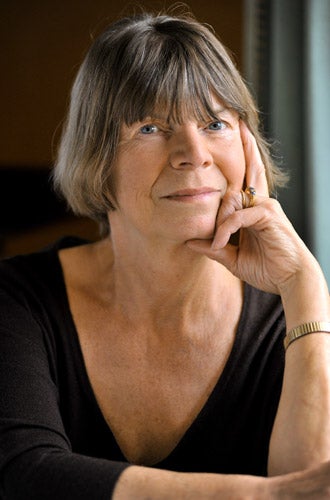Passed/Failed: An education in the life of the novelist, critic and biographer, Dame Margaret Drabble
'We were never punished at school'

Margaret Drabble DBE, 70, has written 16 novels since A Summer Birdcage in 1963, including The Needle's Eye and The Radiant Way. Her non-fiction The Oxford Companion to English Literature and her recent memoirs The Pattern in the Carpet. An updated version of A Writer's Britain has just been published. She is the sister of novelist A S Byatt. Her first husband was actor Clive Swift and she is now married to biographer Michael Holroyd.
My disappointment, on the first day at the delightful village school in East Hardwick near Pontefract was that we didn't do the sort of handicraft I'd been told we'd be doing: sticking things down. I was very keen to go back and we did it on the second day. There were only two teachers – one for the big ones and one for the little ones.
I was sorry to leave at seven when we went to Sheffield. I didn't like the junior department of Sheffield Girls High School. It was a much more regulated, bossy kind of school: you had to finish all your dinner, which really annoyed me as the food was inedible.
My parents obviously had a great respect for Quakers, as they sent us to The Mount, the Friends' boarding school in York. I'm not a believer but I remain very impressed by Quaker faith and behaviour. The evening gathering was a meditation – "medi" – a silence to reflect on your day. There was no punishment of any sort. The worst that could happen was that you would be called to the headmistress's study and given a little talking to. The overall feeling was of respect for children and teachers. Was I a prefect? I think so. But there was no punishment, so no power.
There was brilliant English teaching; the classes of one particularly gifted teacher were better than a lot at Cambridge. Like many girls' schools, it was weak in the sciences. I did biology O-level – we had to get one science subject to go to university – but I was allowed to do German instead of maths. I always have to ask my husband to do my VAT.
I was at school with Judi Dench. She played Ariel in The Tempest and Titania in A Midsummer Night's Dream, in which I played a fairy. I played St Joan with the "brother" school, Bootham, where they had to import some women for their plays.
When I complained about the boredom at home, my mother said, "It'll be fine when you get to Cambridge." This was true. I was delighted to get a scholarship to Newnham. There is something about a women's college which is quite comfortable and relaxing. I was at two single-sex institutions which remain single sex.
Some of the teaching was fairly average but I found two very good, young supervisors. I didn't go to many lectures. I went to see C S Lewis once, just to see him; his lectures were events. Expectations were high; you were asked to read all the Restoration dramas in a fortnight – and we did.
I used to do academic work in the holidays. I was spending a lot of time with theatrical folk; Ian McKellen, Derek Jacobi and my first husband, Clive Swift, were contemporaries. Because of the shortage of women, I got interesting parts: Titania, Viola, Imogen.
I got a "starred" first in Part II; I still don't know what it meant. I thought I was going to be an actress, but it didn't work out. I think I was only employed at the RSC because Clive was working there. I was only good at tragedies and I don't think that is much of a living.
Join our commenting forum
Join thought-provoking conversations, follow other Independent readers and see their replies
0Comments